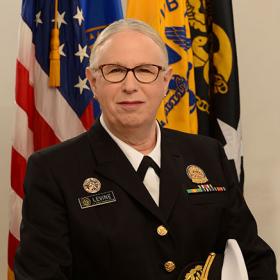This year for Women’s History Month, we want to highlight women who have impacted the daily lives of Pennsylvanians and improved our world.

Admiral Rachel L. Levine, MD, is a highly accomplished physician and public health expert who has significantly contributed to the medical field throughout her career. As a transgender woman and a member of the LGBTQ+ community, Dr. Levine has also been a powerful advocate for greater inclusion and diversity in healthcare.
Dr. Levine began her medical career studying pediatrics and psychiatry at New York City’s Mount Sinai Hospital. In 1993, she joined the faculty of Penn State College of Medicine and the staff at Penn State Hershey Medical Center. She later served as the Pennsylvania Physician General and was appointed as the state’s Secretary of Health in 2017. In this role, she was responsible for overseeing the state’s response to the COVID-19 pandemic and worked tirelessly to protect the health and safety of all Pennsylvanians.
One of Dr. Levine’s most significant achievements as Secretary of Health was her leadership in the fight against the COVID-19 pandemic. She was instrumental in implementing policies and protocols to slow the spread of the virus and ensure that hospitals and healthcare workers had the resources they needed to care for patients. As a result, under her guidance, Pennsylvania reduced the number of COVID-19 cases and deaths, and the state’s vaccination efforts have been among the most successful in the country.
“I’m not here to be a celebrity. I’m here to be a physician and a Secretary of Health and protect the public health of Pennsylvania.”
– Dr. Rachel Levine, 2020 interview with WNEP
In addition to her work on the pandemic, Dr. Levine has been a champion for many other public health issues. She has worked to combat the opioid epidemic in Pennsylvania and has been a strong advocate for mental health awareness and suicide prevention. She has also been a vocal proponent of healthcare reform and universal access to quality healthcare, particularly for underserved communities.
As a transgender woman, Dr. Levine has faced significant discrimination and barriers in her career. However, she has been a powerful advocate for greater inclusion and acceptance of LGBTQ+ individuals in healthcare. She has spoken openly about her experiences as a transgender person and has worked to raise awareness and understanding of the unique healthcare needs and challenges faced by LGBTQ+ patients.
In a 2022 interview with NPR, Levine said, “I’m not a political person.” But in this context, she says, when young trans people are being attacked by their own governments, she thinks medical professionals “need to stand up and be more vocal — and that’s exactly what I’m going to do.”
Dr. Levine’s accomplishments and contributions to the medical field have not gone unnoticed. In 2021, she was nominated by President Joe Biden to serve as the Assistant Secretary of Health in the United States Department of Health and Human Services. After a bipartisan vote to confirm President Biden’s nomination, she is now the first openly transgender person to hold a Senate-confirmed position at the federal level.
Dr. Levine’s success in the medical field and her dedication to improving healthcare for all people, particularly those from marginalized communities, inspire women everywhere. In addition, her achievements serve as a reminder of the importance of diversity, inclusion, and equity in healthcare and the crucial role that women play in shaping the future of medicine.
During Women’s History Month, we celebrate Dr. Rachel Levine and the countless other women who have made significant contributions to the medical field. Their accomplishments serve as a testament to the power of women and their ability to effect change in the world.
Follow Admiral Rachel L. Levine, MD, on Twitter to learn more about her ongoing effort to improve the health and well-being of all Americans.
Women’s History Month
Women’s History Month was established in 1981 as a national celebration, with Congress passing Pub. L. 97-28 authorizing the President to designate the week beginning March 7, 1982 as “Women’s History Week.” Congress continued to pass joint resolutions over the next five years, designating a week in March as “Women’s History Week.” In 1987, Congress passed Pub. L. 100-9 after being petitioned by the National Women’s History Project, officially designating March 1987 as “Women’s History Month.” From 1988 to 1994, Congress passed additional resolutions requesting and authorizing the President to declare March of each year as Women’s History Month. Since 1995, each year, Presidents have issued proclamations recognizing and celebrating the contributions women have made to the United States and highlighting the specific achievements women have made in various fields throughout American history.
Learn more at WomensHistoryMonth.gov.
